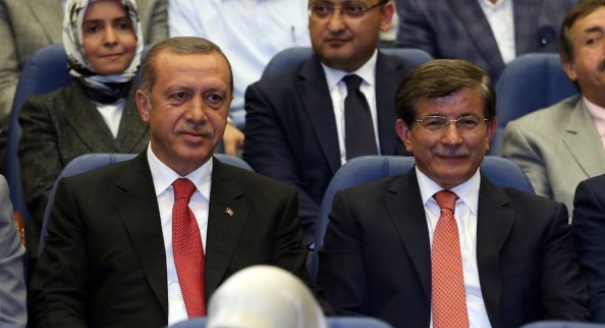In early July, Turkey—whose EU Minister Volkan Bozkır was recently in Brussels to reaffirm the country’s EU accession ambitions—made two moves of crucial importance in the eyes of the EU and the West: forming a new government and stepping up Ankara’s fight against the self-proclaimed Islamic State.
On July 9, Turkish President Recep Tayyip Erdoğan commissioned Prime Minister Ahmet Davutoğlu to form a coalition government taking into account the results of the June 7 legislative election, in which the Justice and Development Party (AKP) lost the ability to form a single-party government it had enjoyed since 2002.
At the same time, all three opposition parties—the social democratic Republican People’s Party (CHP), the Nationalist Movement Party (MHP), and the Kurdish-rooted Peoples’ Democratic Party (HDP)—have made substantial demands on the incumbent prime minister: that corruption allegations against four ministers be relaunched; that the president’s role remain within the boundaries defined by the constitution; and that substantial changes be made to Turkey’s foreign policy.
All three opposition parties are also opposed to a rerun of the June 7 election. Some consider that voicing such a prospect publicly is an unacceptable threat to, or even a denial of, democracy. But President Erdoğan is adamantly attached to creating a strong executive presidency. Since the new parliament’s arithmetic prevents him from achieving this constitutional transformation, his personal preference is for a fresh election, which he assumes would give back the AKP a simple majority.
This is Turkey’s summer quandary: a democratically elected parliament blocks a democratically elected president from reaching his supreme goal of an executive presidency. A coalition would almost certainly deny the president his executive ambition. A rerun would not only create added uncertainties and a huge uproar but could also further weaken the AKP.
Many Turks are apprehensive of a government of two (or more) parties.Tweet This
The various possible coalition combinations have different meanings for the country’s external partners. From an EU and Western point of view, an AKP-CHP or an AKP-HDP coalition would produce a less problematic foreign policy than an AKP-MHP tandem. That is because the MHP traditionally has a more nationalist, inward-looking political orientation.
Turkey’s citizens and outside observers alike will therefore watch the legal deadline for forming a coalition—August 24—with great attention. The outcome is a crucial test for Turkey’s standing in the world.
These domestic political developments occurred simultaneously with fresh moves on the anti–Islamic State front. On July 7, General John Allen, the U.S. president’s special envoy for the global coalition to counter the militant group, and Christine Wormuth, under secretary of defense for policy, visited Ankara.
Although there was no official statement after the meetings the pair held, it is not difficult to identify the focus of the visit, as U.S. President Barack Obama had been pretty outspoken on anti–Islamic State cooperation in the margins of the June 8 G7 summit in Germany. “We’ve been seeking deeper cooperation with Turkish authorities who recognize it’s a problem but haven’t fully ramped up the capacity they need,” the president said.
Then, this happened: On July 6–7, Turkey detained a total of close to 1,600 people trying to cross from Turkish territory into Syria. On July 10, about 30 people suspected of recruiting for the Islamic State and other terrorist organizations were detained in Turkey. Two days later, the Turkish authorities blocked a number of pro–Islamic State websites. Finally, it is rumored that Turkey has upgraded its authorization for the United States to use the Incirlik Air Base for armed drones instead of only surveillance drones.
When added together, these developments illustrate a change of gear in Turkish policy against the Islamic State—and one that brings the country’s stance closer to the policies of its Western allies. For a long time, Turkey was perceived in the West as having an ambivalent attitude vis-à-vis rebel fighters in Syria. In Western eyes, Ankara focused mostly on what could be done to bring down the regime of Syrian President of Bashar al-Assad and somewhat dismissed the considerable threat that Islamic State operatives in Turkey, the EU, and the United States represented to these allied nations.
The Islamic State is as much of a threat to #Turkey as it is to the West.Tweet This
Now, after the bomb attack in the Turkish town of Suruç on July 20, it is beyond doubt that the Islamic State—also known as Daesh—is as much of a threat to Turkey as it is to the country’s Western allies.
Recently, the most effective fighters against the Islamic State—the People’s Protection Units (YPG), the military branch of the Syrian Kurdish Democratic Union Party (PYD)—achieved spectacular progress against the militants by acting with U.S. close air support. That success not only raised eyebrows in Ankara but also illustrated that the Islamic State was not the irresistible force it had claimed to be, but that it could be pushed back when the proper array of military tools were put into action.
This is exactly where Turkey can be instrumental. Ankara’s effective participation in the anti–Islamic State coalition in the weeks and months ahead will be another crucial test for Turkey’s relationship with Western countries.
A busy summer for Turkey, both at home and abroad.






.jpg)
